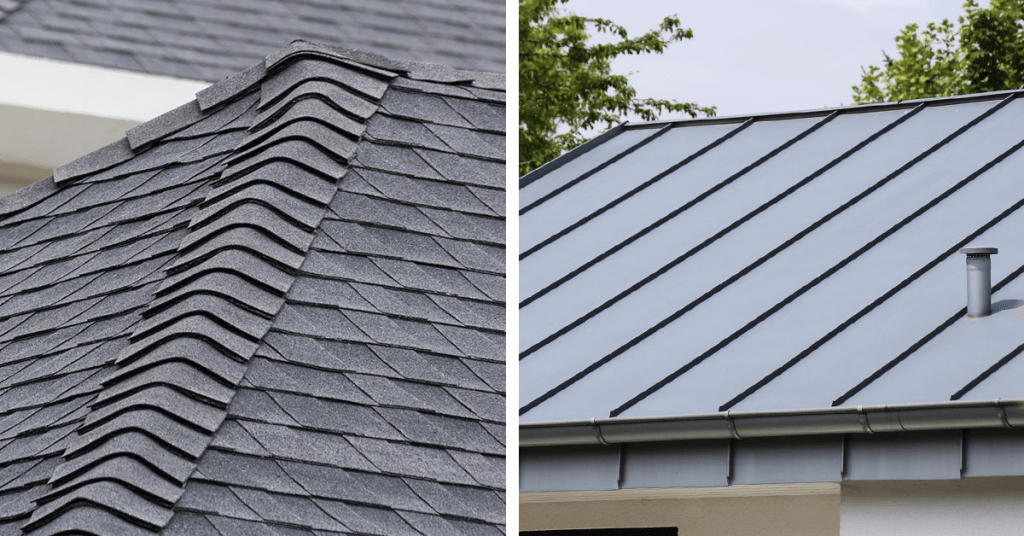When considering a new roof for your home, one common question arises: Do metal roofs leak more than shingles? This is a crucial query for homeowners looking to make an informed decision about their roofing materials. In this article, we will delve into the characteristics of metal roofs and shingle roofs, compare their performance regarding leaks, and address common myths and facts.

Understanding Metal Roofs and Shingle Roofs
Before diving into the comparison, it’s essential to understand the basics of metal roofs and shingle roofs.
Metal Roofs
Metal roofs are made from various metals, including steel, aluminum, copper, and zinc. They come in different styles such as standing seam, corrugated, and metal tiles. Metal roofs are known for their durability, longevity, and aesthetic appeal. They are also praised for their resistance to extreme weather conditions and their energy efficiency.
Shingle Roofs
Shingle roofs, on the other hand, are typically made from asphalt, but they can also be made from wood, slate, or composite materials. Asphalt shingles are the most common roofing material in the United States due to their affordability, ease of installation, and variety of styles and colors. Shingle roofs are widely used in residential roofing.
Read too: Decoding Timelines: How Long Does It Take To Replace A Roof and What to Expect
Do Metal Roofs Leak More Than Shingles?
Factors Influencing Roof Leaks
To determine whether metal roofs leak more than shingles, we need to consider several factors that influence roof leaks:
- Installation Quality: The quality of installation plays a significant role in preventing leaks. A poorly installed roof, whether metal or shingle, is more likely to develop leaks.
- Roof Design: The design and slope of the roof can affect its susceptibility to leaks. Steeper roofs tend to shed water more efficiently.
- Maintenance: Regular maintenance and timely repairs are crucial for preventing leaks in both types of roofs.
- Weather Conditions: Exposure to severe weather conditions, such as heavy rain, snow, and strong winds, can impact the likelihood of leaks.
Metal Roofs and Leak Potential
Metal roofs, when installed correctly, are highly resistant to leaks. Here are some reasons why:
- Fewer Seams: Metal roofs often have fewer seams compared to shingle roofs. Seams are potential weak points where water can penetrate, so having fewer seams reduces the risk of leaks.
- Tight Interlocking Panels: Metal roofing panels are designed to interlock tightly, creating a strong barrier against water infiltration.
- Durability: Metal roofs are highly durable and can withstand extreme weather conditions, including heavy rain, snow, and high winds, without compromising their integrity.
- Proper Installation: Proper installation techniques, including the use of high-quality fasteners and sealants, ensure that metal roofs remain leak-free.
Shingle Roofs and Leak Potential
Shingle roofs, while effective, can be more prone to leaks if not installed or maintained properly. Here are some considerations:
- More Seams: Shingle roofs have more seams and overlapping layers compared to metal roofs. Each seam is a potential entry point for water.
- Granule Loss: Over time, asphalt shingles can lose granules, which can compromise their ability to shed water effectively.
- Wind Damage: High winds can lift or displace shingles, creating gaps that allow water to penetrate.
- Regular Maintenance: Shingle roofs require more frequent maintenance to address issues such as cracked or missing shingles, which can lead to leaks if left unaddressed.
Comparing Metal Roofs and Shingle Roofs
Longevity and Durability
- Metal Roofs: Metal roofs are known for their longevity, often lasting 40-70 years with proper maintenance. They are highly resistant to cracking, shrinking, and erosion.
- Shingle Roofs: Shingle roofs have a shorter lifespan, typically lasting 20-30 years. They are more susceptible to damage from UV rays, wind, and temperature fluctuations.
Cost
- Metal Roofs: Metal roofs are generally more expensive upfront compared to shingle roofs. However, their long lifespan and low maintenance costs can make them a cost-effective choice in the long run.
- Shingle Roofs: Shingle roofs are less expensive to install initially, making them a popular choice for budget-conscious homeowners. However, they may require more frequent repairs and replacements over time.
Energy Efficiency
- Metal Roofs: Metal roofs reflect solar heat, reducing cooling costs in the summer. They are also compatible with insulation to improve energy efficiency.
- Shingle Roofs: Shingle roofs absorb more heat, which can increase cooling costs. However, there are energy-efficient shingle options available.
Environmental Impact
- Metal Roofs: Metal roofs are often made from recycled materials and are fully recyclable at the end of their lifespan, making them an eco-friendly option.
- Shingle Roofs: Asphalt shingles are less environmentally friendly due to their petroleum-based composition. Disposal of old shingles can also contribute to landfill waste.
Myths and Misconceptions
Myth: Metal Roofs Are Noisier Than Shingle Roofs
- Fact: Modern metal roofs are designed with noise-reducing underlayment and insulation, making them no noisier than shingle roofs during rain or hail.
Myth: Metal Roofs Attract Lightning
- Fact: Metal roofs do not attract lightning any more than other roofing materials. In fact, they are non-combustible and can provide additional protection in the event of a lightning strike.
Myth: Metal Roofs Rust Easily
- Fact: High-quality metal roofs are coated with protective layers that prevent rust and corrosion. Proper maintenance further ensures their longevity and appearance.
Conclusion
In conclusion, the question “Do metal roofs leak more than shingles?“ can be answered with a resounding no. Both metal and shingle roofs can be leak-free if installed and maintained properly. However, metal roofs offer several advantages, including fewer seams, greater durability, and longer lifespan, which can reduce the risk of leaks over time. While the upfront cost of a metal roof may be higher, its long-term benefits and performance make it a worthwhile investment for many homeowners. Ultimately, the choice between metal and shingle roofs will depend on individual preferences, budget, and specific needs.



Leave a Reply